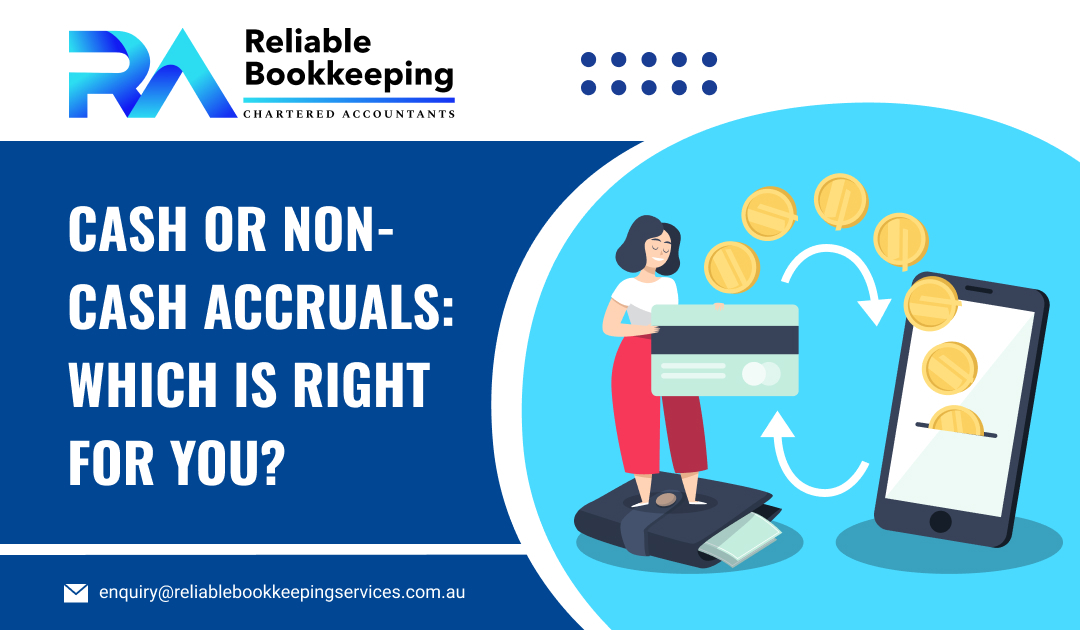It might be difficult for many of you to choose a cash or non-cash accruals accounting method for GST. The method you choose will have an impact when you need to report GST. Businesses with total turnover of less than $10 million, or who use cash accounting for income tax, can use either method. Large enterprises use the non-cash method. In this blog post, we’ll explore both accounting methods so you can choose one that matches your requirements. Let’s get started.
Cash Basis GST Accounting Method
Businesses with a total turnover of less than $10 million can use the cash basis method for accounting for GST. Cash basis accounting for GST means you account for GST on a business activity statement that covers the duration in which you make or receive payment for your sales and purchases. The benefits of the cash accounting method:
- the money that flows through your business is better aligned with your activity statement liabilities, so it becomes easy to manage your cash flow
- it is ideal for small businesses that manage cash transactions.
You can use the choose the cash accounting method if any of the following condition applies:
- you are a small business entity – an individual, trust, partnership, or company with a total turnover of less than $10 million
- you are not carrying on a business, but your company’s turnover is $2 million or less
- you account for income tax on a cash accounting method
- you run a company that the ATO has agreed can account for GST on a cash basis irrespective of your GST turnover, that is
- a government school
- a trustee of an endorsed charitable fund or an endorsed charitable institute
- a gift-deductibility entity.
Sales
In the reporting period when you receive payment for your sales, you need to account for the GST payable. If you only receive a partial payment for a sale during a reporting period, you should only account for the GST on the part of the payment you received.
Purchases
You should account for GST credits on your purchases in the reporting period when payment is made. A tax invoice is required to claim a GST credit, except for purchases of $82.50 or less.
While it’s beneficial to claim GST credits in the reporting period of the related purchases, it’s not mandatory. You have up to four years to make a claim.
If you only pay a portion of the cost of a business purchase in a reporting period, you can claim the GST credit corresponding to the amount paid.
Non-Cash Basis GST Accounting Method
Many larger businesses use the non-cash accruals accounting method. Small businesses can use either the cash method or the non-cash method. Using the non-cash method means you account for GST on the business activity statement that covers the duration in which you either:
- you have issued the tax invoice before receiving payment or received any payment
- received the invoice from your supplier prior to making the payment, or made any payment for purchase.
This method is ideal for businesses that are not immediately paid and is:
- a way to monitor your financial position – what you owe and what is owed
- useful if you deal with more than one contract and large amounts of money.
Sales
You account for GST payables on sales you make in the reporting time in which you receive full or part payment or issue a tax invoice, whichever happens first. It means if you receive a payment prior to issuing the tax invoice, you need to include the GST amount in the reporting time period in which the payment happened, even if it is not the time period you issued the invoice.
Purchases
You need to have a tax invoice for a purchase before claiming a GST credit. It is beneficial to claim your GST credits, in which you either get the tax invoice from your supplier or make payment – but you are not subject to it. You have 4 years to claim credits.
Now, you can choose between cash and non-cash accrual accounting methods for GST. Moreover, make sure you can organise business books and for this, you can get small business bookkeeping services.
Conclusion
The blog outlines information on cash vs accrual GST. You can consult a professional to choose between cash and non-cash accruals. Moreover, if you need someone to look after your business books, you can get our Reliable Bookkeeping Services.

